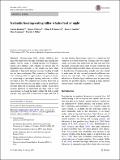Icelandic herring-eating killer whales feed at night
Abstract
Herring-eating killer whales debilitate herring with underwater tail slaps and likely herd herring into tighter schools using a feeding-specific low-frequency pulsed call (‘herding’ call). Feeding on herring may be dependent upon daylight, as the whales use their white underside to help herd herring; however, feeding at night has not been investigated. The production of feeding-specific sounds provides an opportunity to use passive acoustic monitoring to investigate feeding behaviour at different times of day. We compared the acoustic behaviour of killer whales between day and night, using an autonomous recorder deployed in Iceland during winter. Based upon acoustic detection of underwater tail slaps used to feed upon herring we found that killer whales fed both at night and day: they spent 50% of their time at night and 73% of daytime feeding. Interestingly, there was a significant diel variation in acoustic behaviour. Herding calls were significantly associated with underwater tail slap rate and were recorded significantly more often at night, suggesting that in low-light conditions killer whales rely more on acoustics to herd herring. Communicative sounds were also related to underwater tail slap rate and produced at different rates during day and night. The capability to adapt feeding behaviour to different light conditions may be particularly relevant for predator species occurring in high latitudes during winter, when light availability is limited.
Citation
Gaëtan , R , Filatova , O A , Samarra , F I P , Fedutin , I D , Lammers , M & Miller , P 2017 , ' Icelandic herring-eating killer whales feed at night ' , Marine Biology , vol. 164 , no. 2 , 32 . https://doi.org/10.1007/s00227-016-3059-8
Publication
Marine Biology
Status
Peer reviewed
ISSN
0025-3162Type
Journal article
Description
This study was funded by an Icelandic Research Fund (i. Rannsóknasjóður, grant number 120248042) supported by a Marie Curie Fellowship.Collections
Items in the St Andrews Research Repository are protected by copyright, with all rights reserved, unless otherwise indicated.

